John 7 is the seventh chapter of the Gospel of John in the New Testament of the Christian Bible. It recounts Jesus' visit to Jerusalem for the feast of Tabernacles, the possibility of his arrest and debate as to whether he is the Messiah. The author of the book containing this chapter is anonymous, but early Christian tradition uniformly affirmed that John composed this Gospel. Alfred Plummer, in the Cambridge Bible for Schools and Colleges, describes this chapter as "very important for the estimate of the fourth Gospel. In it the scene of the Messianic crisis shifts from Galilee to Jerusalem; and, as we should naturally expect, the crisis itself becomes hotter. The divisions, the doubts, the hopes, the jealousies, and the casuistry of the Jews are vividly portrayed." John 7:1 to 8:59 is sometimes referred to as the "Tabernacles Discourse". Raymond E. Brown describes the Tabernacles Discourse as "a polemic collection of what Jesus said in replies to attacks by the Jewish authorities on his claims".

Romans 13 is the thirteenth chapter of the Epistle to the Romans in the New Testament of the Christian Bible. It is authored by Paul the Apostle, while he was in Corinth in the mid-50s AD, with the help of an amanuensis (secretary), Tertius, who adds his own greeting in Romans 16:22. Paul wrote to the Roman Christians because he was "eager to preach the gospel" to them, so as to remind them on "certain subjects". Although he had been hindered from coming to them many times, he longed to encourage the Roman church by reminding them of the gospel, because of his calling to the Gentiles as well as to the Jews.
Romans 9 is the ninth chapter of the Epistle to the Romans in the New Testament of the Christian Bible. It is authored by Paul the Apostle, while he was in Corinth in the mid-50s AD, with the help of an amanuensis (secretary), Tertius, who adds his own greeting in Romans 16:22.
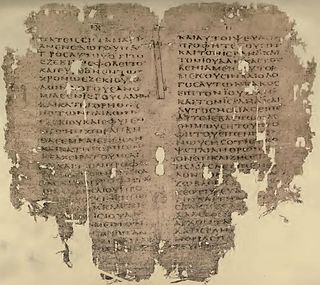
Acts 2 is the second chapter of the Acts of the Apostles in the New Testament of the Christian Bible. The book containing this chapter is anonymous but early Christian tradition asserted that Luke composed this book as well as the Gospel of Luke. This chapter records the events on the day of Pentecost, about 10 days after the ascension of Jesus Christ.

Acts 3 is the third chapter of the Acts of the Apostles in the New Testament of the Christian Bible. The book containing this chapter is anonymous but early Christian tradition affirmed that Luke composed this book as well as the Gospel of Luke. This chapter records the healing of a disabled person by the apostles Peter and John, and Peter's preaching at Solomon's Porch in the Second Temple.
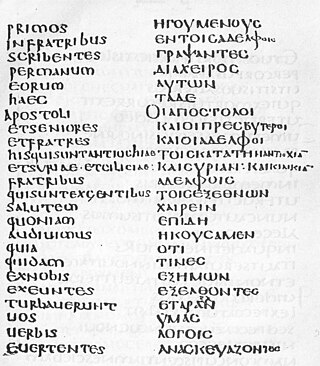
Acts 7 is the seventh chapter of the Acts of the Apostles in the New Testament of the Christian Bible. It records the address of Stephen before the Sanhedrin and his execution outside Jerusalem, and introduces Saul. The book containing this chapter is anonymous, but early Christian tradition uniformly affirmed that Luke composed this book as well as the Gospel of Luke.

Acts 8 is the eighth chapter of the Acts of the Apostles in the New Testament of the Christian Bible. It records the burial of Stephen, the beginnings of Christian persecution, and the spread of the Gospel of Jesus Christ to the people of Samaria and Meroe. The book containing this chapter is anonymous, but early Christian tradition uniformly affirmed that Luke composed this book as well as the Gospel of Luke.

Romans 2 is the second chapter of the Epistle to the Romans in the New Testament of the Christian Bible. It is authored by Paul the Apostle, while he was in Corinth in the mid-50s AD, with the help of an amanuensis (secretary), Tertius, who adds his own greeting in Romans 16:22. Although "the main theme of the Epistle [is] the doctrine of justification by faith", in verse 6 Paul "lays down with unmistakable definiteness and precision the doctrine that works, what a man has done, the moral tenor of his life, will be the standard by which he will be judged at the last day".

Romans 11 is the eleventh chapter of the Epistle to the Romans in the New Testament of the Christian Bible. It is authored by Paul the Apostle, while he was in Corinth in the mid-50s AD, with the help of an amanuensis (secretary), Tertius, who adds his own greeting in Romans 16:22.
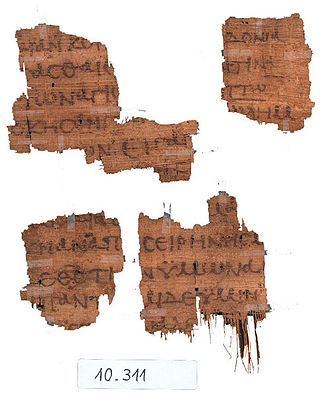
Romans 15 is the fifteenth chapter of the Epistle to the Romans in the New Testament of the Christian Bible. It is authored by Paul the Apostle, while he was in Corinth in the mid-50s AD, with the help of an amanuensis (secretary), Tertius, who adds his own greeting in Romans 16:22.

2 Corinthians 6 is the sixth chapter of the Second Epistle to the Corinthians in the New Testament of the Christian Bible. It is authored by Paul the Apostle and Timothy in Macedonia in 55–56 CE.

Galatians 3 is the third chapter of the Epistle to the Galatians in the New Testament of the Christian Bible. It is authored by Paul the Apostle for the churches in Galatia, written between 49–58 CE. This chapter contains Paul's important argument about Abraham's faith and his 'offspring', a designation for "those belong to Jesus Christ".

1 Thessalonians 5 is the fifth chapter of the First Epistle to the Thessalonians in the New Testament of the Christian Bible. It is authored by Paul the Apostle, likely written in Corinth in about 50-51 CE for the church in Thessalonica. This chapter contains a message about Christ's second coming, and various final exhortations and greetings.

James 2 is the second chapter of the Epistle of James in the New Testament of the Christian Bible. The author identifies himself as "James, a servant of God and of the Lord Jesus Christ" and the epistle is traditionally attributed to James the brother of Jesus, written in Jerusalem between 48 and 61 CE. Alternatively, some scholars argue that it is a pseudographical work written after 61 CE. This chapter contains an exposition about the commandment, "You shall love your neighbour as yourself", and about dead faith.

1 Peter 1 is the first chapter of the First Epistle of Peter in the New Testament of the Christian Bible. The author identifies himself as "Peter, an apostle of Jesus Christ", and the epistle is traditionally attributed to Peter the Apostle, but some writers argue that it is the work of Peter's followers in Rome between the years 70 and 100. After an introductory section, this chapter contains several "general exhortations founded on the blessedness of the Christian state", which continue into chapter 2.

Hebrews 1 is the first chapter of the Epistle to the Hebrews in the New Testament of the Christian Bible. The author is anonymous, although the internal reference to "our brother Timothy" causes a traditional attribution to Paul, but this attribution has been disputed since the second century and there is no decisive evidence for the authorship. This chapter contains the introduction ('exordium') about God's final revelation ('word') through his son and how the son is superior to angels.
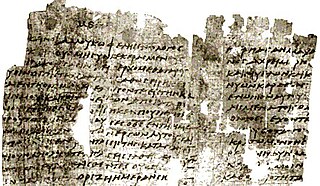
Hebrews 10 is the tenth chapter of the Epistle to the Hebrews in the New Testament of the Christian Bible. The author is anonymous, although the internal reference to "our brother Timothy" causes a traditional attribution to Paul, but this attribution has been disputed since the second century and there is no decisive evidence for the authorship. This chapter contains the exposition about Christ's effective sacrifice and the exhortation to continue in faithfulness and expectancy.
Isaiah 7 is the seventh chapter of the Book of Isaiah in the Hebrew Bible or the Old Testament of the Christian Bible. This book contains the prophecies attributed to the prophet Isaiah and is one of the Books of the Prophets.
Isaiah 54 is the fifty-fourth chapter of the Book of Isaiah in the Hebrew Bible or the Old Testament of the Christian Bible. This book contains the prophecies attributed to the prophet Isaiah, and is one of the Books of the Prophets. Chapters 40-55 are known as "Deutero-Isaiah" and date from the time of the Israelites' exile in Babylon.
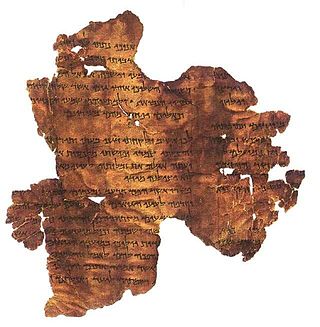
Hosea 13 is the thirteenth chapter of the Book of Hosea in the Hebrew Bible or the Old Testament of the Christian Bible. In the Hebrew Bible it is part of the Book of the Twelve Minor Prophets. This chapter and the next one may belong to the troubled times that followed Pekah's murder by Hoshea. The subject is the idolatry of Ephraim, notwithstanding God's past benefits, destined to be his ruin.
















